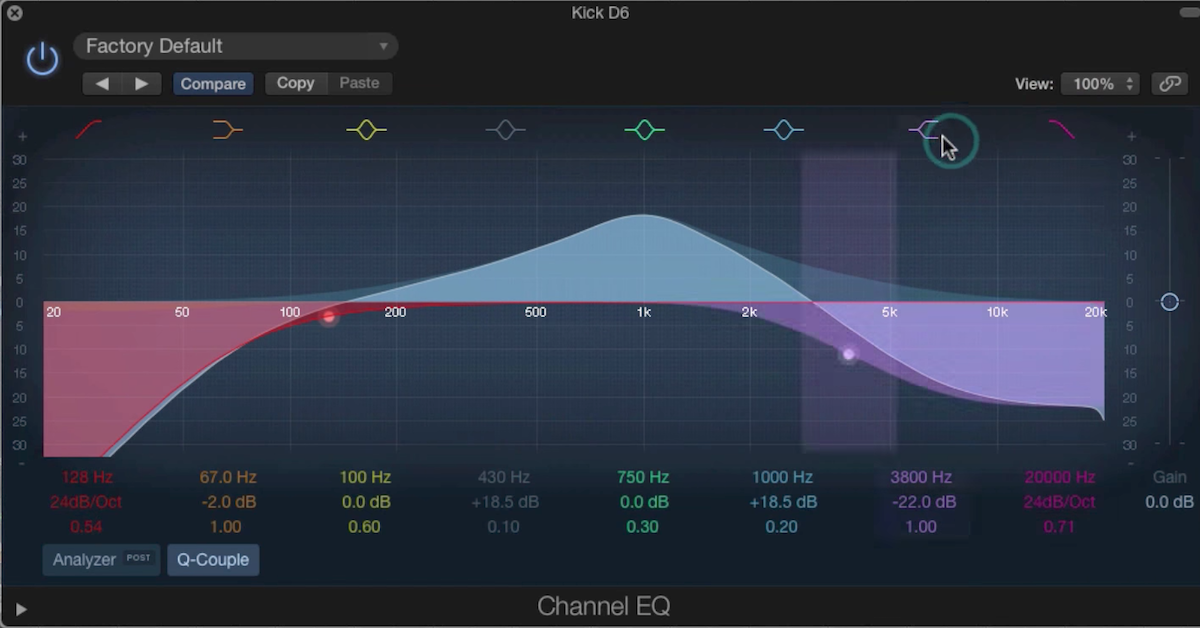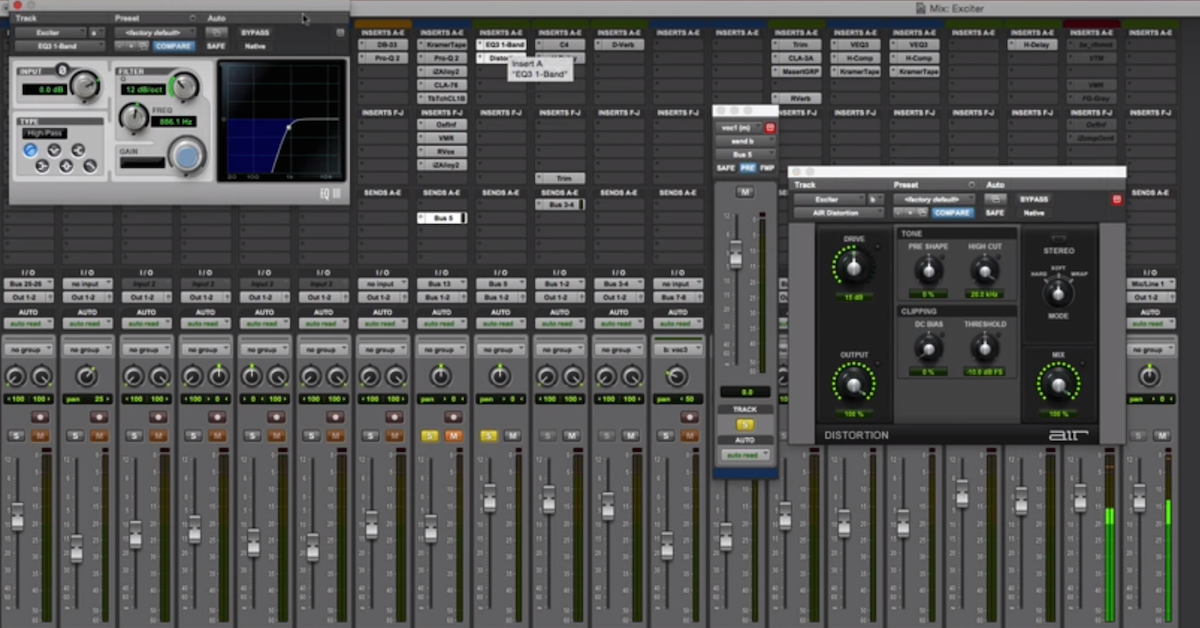5 Stock Plugins You Should Replace First
Article Content
As an audio engineer, an important tool for recording is the Digital Audio Workstation (DAW). There are many DAW options to choose from, including Pro Tools, Logic, Cubase, Nuendo, Reaper, Reason, Studio One, etc.
There are many differences to consider between DAWs, but that’s a topic for a different day.
One similarity between DAWs is the use of plugins for instruments and signal processing.
All modern DAWs come bundled with a set of stock plugins for you to use as soon as you install the DAW.
These stock plugins usually cover the basic signal processors and instruments necessary for an audio engineer and producer. Nonetheless, you can replace these stock plugins with many 3rd party options.
These additional purchased plugins are under the same categories of processors/instruments as stock plugins, but they can function and sound differently.
Prior to purchasing and replacing stock plugins, I recommend two things: learning (and even mastering) how to use your stock plugins, and supplementing your stock plugins with other free plugins.
Contrary to conventional wisdom, stock plugins are extremely powerful and can sound great if used correctly. In fact, a set of stock plugins in the hands of an experienced engineer is more than sufficient to create a professional mix. It is tempting to think that your mixes could be significantly improved by spending a lot of money on new gear. However, this can be a very costly decision if you do not know how to use the tools at your disposal.
Additionally, there are many free options of plugins that can supplement what you already have, without having to spend any money. Depending on your DAW and OS, there are a large collection of free VST, AU, RTAS, and AAX plugins. Plugins like the Softube Saturation Knob are a no-brainer to add analog console saturation to your collection.
The Native Instruments Kontakt Player is a free version of their sampler, and there are many sample libraries can be loaded in the software for free. If your DAW has a stock convolution reverb, then you should consider downloading and using a wide range of free impulse response libraries of acoustic spaces and hardware reverb units.
When it comes time to replace your stock plugins, here are some thoughts on what to consider replacing first.
Limiter
Even though limiters typically have few parameters of control, there are actually a wide range of algorithms that can be used to perform limiting.
The best algorithms typically take a lot of research and development, and therefore can cost a lot of money. Stock limiter plugins are sufficient for some applications, but are more likely to add audible artifacts, distortion, and pumping to a mix.
Besides dynamic range compression, a good limiter will include dithering. There are many types of dithering, and the best include perceptual noise shaping to make the dithering process imperceptible.
When purchasing a limiter, make sure to choose an option that includes both high quality dynamic range reduction as well as dithering.
Piano
One of the most common virtual instruments included as a stock plugin is a piano.
The piano is an important instrument in several styles of music ranging from Pop, Jazz, Classical, Blues, R&B, Rock, and Country. It’s a very difficult and expensive instrument to record, requiring a nice room, microphones, preamps, not to mention an actual piano.
The piano virtual instruments that come with most DAWs can be a huge improvement over trying to record a real piano on a low budget.
If your mix requires a background piano part, the stock plugin might be exactly what you need. However, if the piano part is featured in your mix, then you should probably consider a higher quality option. There is nothing worse than having your listeners think, “that sounds like a fake piano.”
Harmonic Saturation/Distortion
Even though you’re recording in a DAW, you may not want your audio to sound completely digital (i.e. linear). Depending on the style of music, an analog console saturation plugin might be exactly what you need to add some extra vibe.
If you cannot achieve the sound you’re after with the Softube Saturation Knob plugin, there are many options of modeling plugins based on specific analog desks.
Several companies offer plugins that model the analog character of SSL, Neve, EMI, Trident, and API desks. However, just because a similar desk is modeled in each plugin, does not mean that the underlying algorithm and sound is the same. Your best bet is to demo several plugins at the same time and hear which one you prefer.
Similarly, guitar amp simulation is another type of harmonic saturation plugin that’s very useful for a modern audio engineer.
Sometimes it’s too costly/time-consuming/logistically impossible to record a real guitar amp. Non-linear signal processing is very complex, and modeling algorithms can vary widely. A Vox AC30 amp model in your stock plugin can sound very different from the same amp modeled in a different plugin.
The technology for guitar amp modeling is constantly improving, so it’s valuable to invest in the latest technology if your music features electric guitar. For the most realistic simulated amp sounds, check out various options of speaker cabinet convolution plugins.
Sampler
Besides having a high-quality sampled piano, any audio engineer or producer working with modern styles of music should have a proper sample library and a plug-in sampler for playback and organizational purposes.
Audio sampling has become increasingly popular for everything from acoustic and electronic drums, keyboards, synthesizers, loops, cinematic hits/swells/stabs, guitars, bass, and even vocals.
Placing audio samples in the timeline of your song can be a laborious task. A sampler is very helpful if you want to quickly trigger the samples via a MIDI controller to add them to your track. A sampler can also be helpful for time expansion/compression of loops to fit the tempo of your track.
As you build up your sample library, it can be a challenge to keep track of all the audio files. Any sampler worth purchasing should help you organize, access, and search through your library very quickly.
If you are investing in a sampler plugin, you should consider the library included with the plugin, and also your expansion options down the road.
Reverb
Depending on your DAW of choice, it may include a stock algorithmic reverb plug-in (such as DVerb in Pro Tools) or it might include a stock convolution reverb (Space Designer in Logic). It’s a good idea to have a plugin that represents both options, as certain mix situations require having one or the other.
When you’re purchasing a new plugin, look for an option that includes high-quality algorithms or impulses of a variety of reverb sounds: chamber, hall, studio, plate, spring, church, etc. If you are after a certain “synthetic” reverb sound, do your research ahead of time before picking a plugin emulation of the classics (EMT, Lexicon, etc).
More
Besides these plugins, there are many options for equalization and compression. However, especially in the case of EQ, most spectral processing can be accomplished using the stock plugins. It’s not until your skills and workflow require more complicated processing like linear phase EQ, that it becomes necessary to purchase additional options.
Similarly, in the case of compression, don’t underestimate the power of your stock compressor. There are plenty of skills to master regarding the use of the compressor before considering more advanced processors. Eventually you may get to a point where your skills and workflow require the use of plugins that have multiband compression.
In conclusion, make the most of the stock plugins that come with your DAW and be very intentional about how you supplement and add to your plugin collection.






